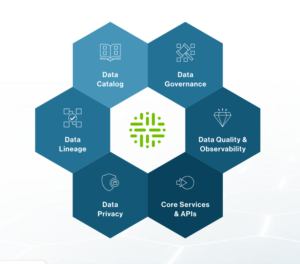

(Den Rise/Shutterstock)
If you’re in sales and marketing, you look to Salesforce for automation. If you manage IT assets, it’s ServiceNow. Human resources? That’s Workday. But what if data is the underlying asset? What platform do you turn to? It may not be Collibra in a landslide just yet, but executives at the data intelligence company make a compelling case that eventually it may be.
Collibra has come a long way from its 2008 founding, when co-founders Felix Van de Maele and Stijn Christiaens spun a project on collaborative semantics out of the STARLab at a university in Brussels, Belgium. The company’s first product was Data Governance Center, which used metadata to help customers track and govern their data assets.
For the next six years or so, the company advocated for data governance. Van de Maele and Christiaens sought to empower chief data officers and data stewards to have a greater role setting the rules behind data access during the early heydays of the big data boom.

Collibra Data Intelligence Cloud delivers a unified solution for data governance, lineage, discovery, catalging, quality, observability, privacy, and security.
Around 2014, Collibra added a data catalog to the mix. A data catalog was a natural fit with data governance, says Christiaens, the company’s chief data citizen. When somebody discovers a piece of data in a catalog, the first decision that needs to be made is whether he or she should be authorized to access it, which is data governance.
In 2016, faced with the new General Data Protection Regulation (GDPR) law, the company added data privacy and security, which would be called Collibra Protect. Finally, in early 2021, it added a data quality component with the acquisition of OwlDQ.
At some point along the way, it became apparent that data governance was no longer the headlining act. The company concluded that leading with data governance was actually a big turn-off to potential customers, Christiaens said.
“We found that governance had too much of a negative connotation: the data police,” Christiaens said last week at its Data Citizen ’22 conference, Collibra’s two-day user conference that attracted 1,000 attendees to San Diego. “In governance, you’re always going to be bucketed into that old, defensive data strategy that started the industry.”
The company that started out in firmly in the data governance camp searched for a new term that more accurately reflected the diversity of data capabilities that it offered and what it had become. The phrase “data intelligence” was born.
Data intelligence not only has a better ring to it than data governance, but it more accurately reflects the ultimate destination at the end of the big data tunnel that Collibra is trying to usher customers through, according to Christiaens.
“When you go in the elevator with the CEO and you start talking about data governance, their eyes glaze over,” Christiaens said. “But when you talk about data intelligence with them, and say hey, your competitors are doing better with data, how can we become more intelligent and connect the data to the value? You can have a whole other conversation.”
System of Data Engagement
That customers are struggling to get value out of their data and analytics investments is no secret. Study after study point to structural problems with data as a major impediment to becoming truly data-driven.

Collibra CEO Felix Van de Maele at Data Citizens 22 conference in San Diego Nov 3 (Image courtesy Collibra)
Data management is one issue, as customers continually seek new and better tools and techniques to rein in the typical sprawl of databases, file systems, and data lakes, with ETL/ELT pipelines connecting it all. Collibra’s goal is to sit one layer above the data management fray, providing a check on the messy digital chaos below with its SaaS, cloud-based offering.
“You have great databases and great tools,” said Van de Maele, who is Collibra’s CEO. “But what’s the system you’re going to use to bring all those teams together to say, hey if you’re a data analyst, business analyst, data engineer, analytics engineer, data steward, product steward–all those things–how are you actually going to automate those workflows and bring those people together to be productive? And that’s how we think of Collibra, to be the single system of engagement for the data function.”
The cloud giants increasingly are getting into the data management game, with an array of offerings for moving, storing, transforming, and analyzing data. They will also invariably offer data catalogs, which doesn’t concern Collibra too much. “Everyone and their dog is going to have a catalog,” Christiaens said.
But the hyperscalers’ catalogs won’t work with data residing in other hyperscalers’ data centers, which hurts the overall viability of having a single catalog for a customer’s entire data estate. That gives an opportunity for Collibra to become the Switzerland of data access and data intelligence.
“We believe that the future is in the cloud. We work with all the cloud players,” Christiaens said. “We also believe that our customers are going to be hybrid, that legacy on-prem isn’t going to go away over the next 10 years, and so we work with both. We take that Switzerland position, if you will, that says we’ll work with the future and we work with the past.”
Large and Growing Market
The New York-based company today has just north of 800 customers, including a good chunk of the Fortune 100, and it’s target market is the Global 2000. Larger customers with a strategic view of data are more apt to buy the entire suite of integrated tools, while smaller firms are more likely to buy one component of the suite.
In either case, the goal is the same: Give customers a single, metadata-driven platform for governing their complex data estates, and helping them be more strategic about data while boosting productivity and minimizing risk.
“That’s how we think about Collibra, as that single system of engagement, that single platform,” Van de Maele said “The core to all of that is, of course, metadata. That’s the essence. So that’s why we built out the data intelligence platform that combines governance, catalog, lineage, quality, observability, privacy and security.”
We’re very early into the data journey, Van de Maele says, but enough progress has been made to show that a new approach is needed for supporting modern data architectures running in the cloud. Collibra has thrown its hat into the data intelligence ring, and is taking a stand with its integrated, cloud-based suite of tools for governing and getting value out of data.
“If you’re really strategic about data, I don’t think there’s any difference between data and finance, IT, sales and marketing, and engineering,” he said. “You have to think of data as a function that you need to support, and every other function has a system to support that function. You have ServiceNow to run IT…You have Salesforce for sales and marketing. Workday to run HR. But you don’t really have something to run your data function.”
Well, Collibra, for one.
Related Items:
New Study Finds Data Intelligence Maturity Drives 3x Better Business Outcomes
Data Intelligence Focus Rewarding for Collibra
Collibra Announces $112.5 Million Funding Round, $2.3 Billion Valuation
December 20, 2024
- Reltio Recognized as Best-of-Breed Representative Vendor in 2024 Gartner Market Guide for Master Data Management Solutions
- CapStorm Releases Salesforce Connector Offering Seamless Data Integration with Snowflake
- LogicMonitor and AppDirect Partner to Bring Hybrid Observability Solutions to IT Service Providers
- Patronus AI Launches Small, High-Performance Judge Model for Fast and Explainable AI Evaluations
- Equinix Unveils Private AI Solution with Dell and NVIDIA for Secure, Scalable AI Workloads
December 19, 2024
- Hydrolix Reports Technology Partner Ecosystem Momentum
- EQTY Lab, Intel, and NVIDIA Introduce Verifiable Compute AI Framework for Governed AI Workflows
- NeuroBlade Empowers Next-Gen Data Analytics on New Amazon Elastic Compute Cloud F2 Instances
- Quantum Announces Support for NVIDIA GPUDirect Storage with Myriad All-Flash File System
- Kurrent Charges Forward with $12M for Event-Native Data Platform
- Timescale Details PostgreSQL’s Growing Adoption Across Industries in 2024
- Altair Enhances RapidMiner with Graph-Powered AI Agent Framework
- Esri Releases 2024 Update of Ready-to-Use US Census Bureau Data for ArcGIS Users
December 18, 2024
- Qlik Shares 2025 AI and Data Trends: Authenticity, Applied Value, and Agents
- Domo Releases 12th Annual ‘Data Never Sleeps’ Report
- Dresner Advisory Services Publishes 2024 Embedded Business Intelligence Market Study
- Starburst Helps Arity Streamline Data Insights with Scalable Lakehouse Architecture
- Vultr Expands Global Reach with New Funding at $3.5B Valuation
- Ataccama Extends Generative AI Capabilities to Accelerate Enterprise Data Quality Initiatives
- Menlo Ventures Announces Cohort Backed by $100M Anthology Fund Launched in Partnership with Anthropic



























